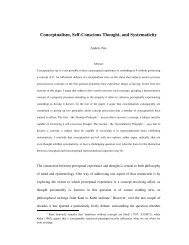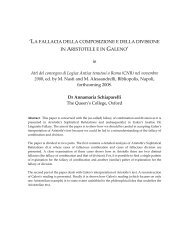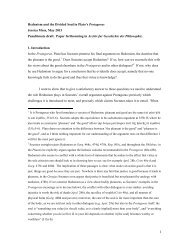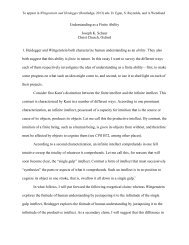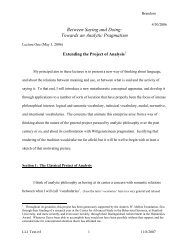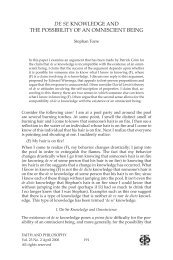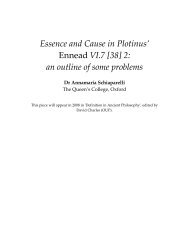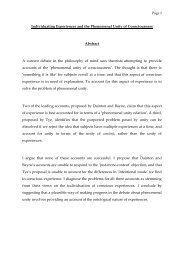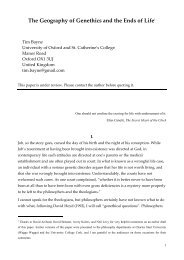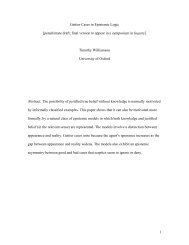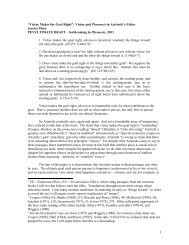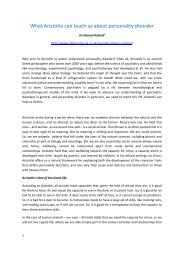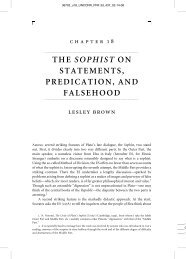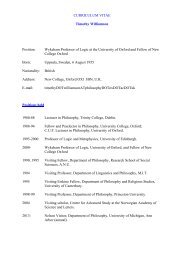Say who everyone is as you go along - Faculty of Philosophy ...
Say who everyone is as you go along - Faculty of Philosophy ...
Say who everyone is as you go along - Faculty of Philosophy ...
You also want an ePaper? Increase the reach of your titles
YUMPU automatically turns print PDFs into web optimized ePapers that Google loves.
32<br />
'We ourselves are responsible for our own happiness and m<strong>is</strong>ery. We create our own<br />
heavens. We create our own hells. We are the architects <strong>of</strong> our own fate' (WD 17)<br />
Nevertheless, neither Nietzsche nor the Zen Buddh<strong>is</strong>ts env<strong>is</strong>ion a straightforward<br />
transition from suffering to happiness. There <strong>is</strong> a philosophical problem standing in<br />
the way <strong>of</strong> th<strong>is</strong>. Happiness and unhappiness are dialectically related. In a qu<strong>as</strong>i<br />
Hegelian sense, happiness and unhappiness are antithetical. Although semantically,<br />
psychologically and ontologically, opposites, happiness and unhappiness are<br />
mutually dependent on all three levels. It follows that one can no more abol<strong>is</strong>h<br />
unhappiness and leave happiness <strong>as</strong> a residue that one may abol<strong>is</strong>h up so that there<br />
remains only down. Th<strong>is</strong> dialectical dependence <strong>is</strong> implicit in Nietzsche's remark:<br />
'without our ready tolerance <strong>of</strong> pain we should have to give up too many ple<strong>as</strong>ures!'<br />
(DD para.354 p.166)<br />
It <strong>is</strong> a commonplace (inexplicable by evolutionary theory) that many ple<strong>as</strong>urable<br />
human activities cause us suffering. Harmful and addictive drugs such <strong>as</strong> alcohol,<br />
heroin and nicotine bring d<strong>is</strong>e<strong>as</strong>e and death. Sexual relationships might bring<br />
anxiety, emotional trauma, and d<strong>is</strong>e<strong>as</strong>e. Overeating causes obesity and heart d<strong>is</strong>e<strong>as</strong>e.<br />
These are specific instances <strong>of</strong> the dependence <strong>of</strong> happiness on unhappiness.<br />
Nietzsche says<br />
'happiness and m<strong>is</strong>fortune are brother and s<strong>is</strong>ter' (GS 267)<br />
Nietzsche calls h<strong>is</strong> suffering h<strong>is</strong> dog:<br />
'My Dog. - I have given a name to my suffering, and call it "dog", - it <strong>is</strong> just <strong>as</strong><br />
faithful, just <strong>as</strong> importunate and shameless, just <strong>as</strong> entertaining, just <strong>as</strong> w<strong>is</strong>e, <strong>as</strong> any<br />
other dog' (GS 244)<br />
The metaphor <strong>is</strong> in many ways apposite. Suffering <strong>is</strong> faithful because it follows with<br />
inevitability certain kinds <strong>of</strong> thought and action. Suffering <strong>is</strong> importunate and<br />
shameless because it appears irrespective <strong>of</strong> one's w<strong>is</strong>hes to the contrary. It <strong>is</strong><br />
entertaining because it <strong>is</strong> just about possible to view suffering with wry, cynical,<br />
humour. It <strong>is</strong> w<strong>is</strong>e because it teaches <strong>you</strong> about life. Nietzsche h<strong>as</strong> already pointed<br />
out that we are ironically attached to our suffering. We are also attached to pet dogs.<br />
If Nietzsche were to push the metaphor to its Zen conclusion he would have to adv<strong>is</strong>e<br />
freeing the dog.<br />
Despite, or perhaps because <strong>of</strong>, their endorsement <strong>of</strong> the qu<strong>as</strong>i-Hegelian ‘identity’<br />
(ie, mutual dependency) between happiness and unhappiness, Nietzsche and the Zen<br />
Buddh<strong>is</strong>ts think th<strong>is</strong> opposition may be transcended in a higher form <strong>of</strong> happiness.<br />
The transcendence <strong>is</strong> qu<strong>as</strong>i-Hegelian because it <strong>is</strong> dialectical (or more accurately,



